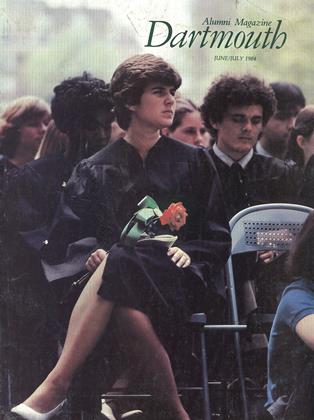Looking at the Other Side
It all started when Gordon Piatt (Great Neck, N.Y.) noticed that many undergraduates showed "a lack of concern for issues outside of Dartmouth." Coupling this observation with a passion for studying the Soviet Union, Piatt began organizing "Through the Looking Glass: An American View of the USSR" that, when completed this spring,, will have brought speaking visits from a number of authorities on Soviet affairs including Dean Rusk, Zbigniew Brzezinski, and Harrison Salisbury.
"I saw it as a good way to get the experts up here to talk about their experiences," Piatt explains. "A lot of them are people who actually made the decisions on the Soviet Union. This would be better than reading about them in a book; people get to hear them speak and find out how they're thinking."
The amazing thing about the series is that Piatt, with help from the Dartmouth World Affairs Council of which he is director planned almost the whole thing. As Professor Frank Smallwood '51 put it, "When he came to me last summer, he had already contacted all of the speakers. .. . The interesting thing to me is that it had an incredible turnout and a large response and it hasn't cost that much he got a lot of the people to [virtually] volunteer their services."
Piatt's interest in Soviet affairs began almost by accident. "When I came here, I decided to try a language that was a little different." Russian fit that bill and, as he put it, "one thing led to another." Since then he has travelled through the Soviet Union on Dartmouth's foreign study program, worked as a visiting scholar at Columbia University's W. Averell Harriman Institute for the Advanced Study of Soviet Union and has written a thesis for his Russiangovernment major on the depiction of Stalin in Soviet literature. Next year, Piatt will study at the London School of Economics on a Reynolds Scholarship.
Piatt said he learned tremendously from his trip to the USSR. "Things are better in some ways than you think it would be, worse in other ways. There's not people getting picked up on every corner by men wearing trench coats . . . [but] I hadn't thought that the food would be as bad as it was."
Piatt said his study of the Soviet Union has made him "become more American," to appreciate the United States more and to question some of the tenets of Communism. "Some of it sounds good in theory but if you're there it's obvious that it just doesn't work."
In addition to his activities with the World Affairs Council, Piatt, who is Phi Beta Kappa with a 3.83 grade point average, founded "The Great Issues Series" which, in his words, "tried to foster some dicussion" among a mix of faculty, students and members of the community on various topics of controversy. Piatt admits the response was "a little disappointing maybe the issues weren't great enough" but attributes it in part to apathy bred by "a false sense of security" encouraged by Dartmouth's isolation. "It's great that people have a boycott of Thayer over the meal contract, but on liberal or conservative issues people often have nothing to say."
"It's great that people have a boycott ofThayer over the mealcontract, but on liberal or conservativeissues people oftenhave nothing tosay."
 View Full Issue
View Full Issue
More From This Issue
-
 Feature
FeatureProfessor John Stearns '16: Rara Avis Una
June | July 1984 By Eddie Chamberlain '36 -
 Feature
FeatureCreativity: The Open Dance at Dartmouth
June | July 1984 By Prof. Blanche Gelfant -
 Feature
FeatureWearers of the Green
June | July 1984 By Jim Kenyon -
 Feature
FeatureThe Best Part of My Academic Life Here
June | July 1984 -
 Feature
FeatureMaking it Happen
June | July 1984 By Peggy Sadler -
 Feature
FeatureThe Quiet Good Man
June | July 1984 By Young Dawkins '72
Brad M. Hutensky '84
-
 Feature
FeatureNine From '84
JUNE/JULY 1984 By Brad M. Hutensky '84 -
 Feature
FeatureCOOPERSTEIN
JUNE/JULY 1984 By Brad M. Hutensky '84 -
 Feature
FeatureCALLAHAN
JUNE/JULY 1984 By Brad M. Hutensky '84 -
 Feature
FeatureBURNLEY
JUNE/JULY 1984 By Brad M. Hutensky '84 -
 Feature
FeatureCARSON
JUNE/JULY 1984 By Brad M. Hutensky '84 -
 Feature
FeatureHARRIS
JUNE/JULY 1984 By Brad M. Hutensky '84
Features
-
 Feature
FeatureScholarship Aid at Record Level
JANUARY 1969 -
 Feature
FeatureMEDIA MONSTER: The Rise of Rankings
Nov/Dec 2000 -
 Feature
FeatureNever Say Die or Adversity Foiled the Story of 100 Years of Rowing
April 1957 By CLIFFORD L. JORDAN '45 -
 FEATURE
FEATURERemnants of a Moment
MAY | JUNE 2016 By GAYNE KALUSTIAN ’17 -
 Feature
FeatureSteady State
September 1976 By Pierre Kirch -
 Feature
FeatureUNDERGRADUATE PORTFOLIO 1966
MAY 1966 By TEXT BY LARRY GEIGER '66

